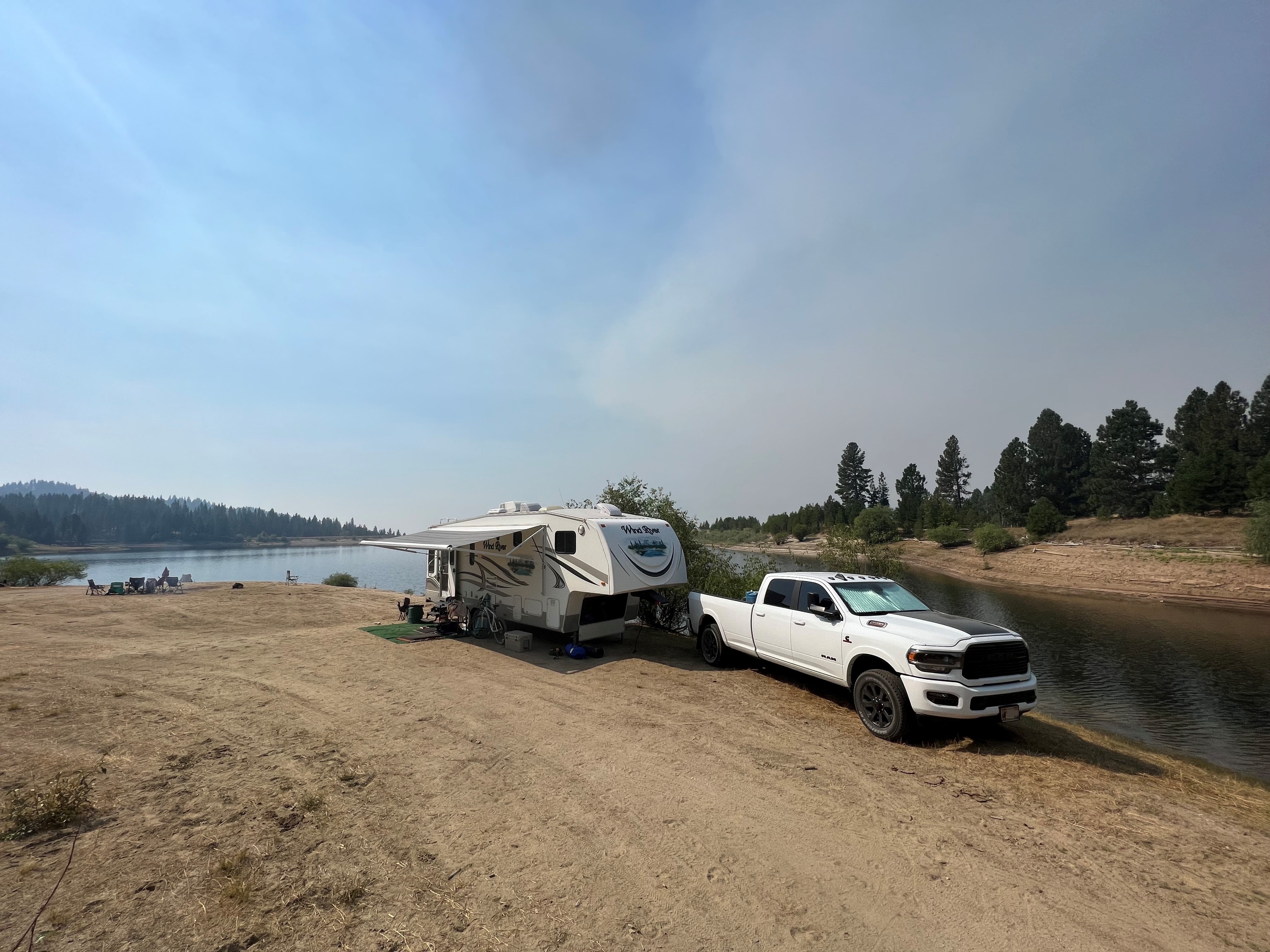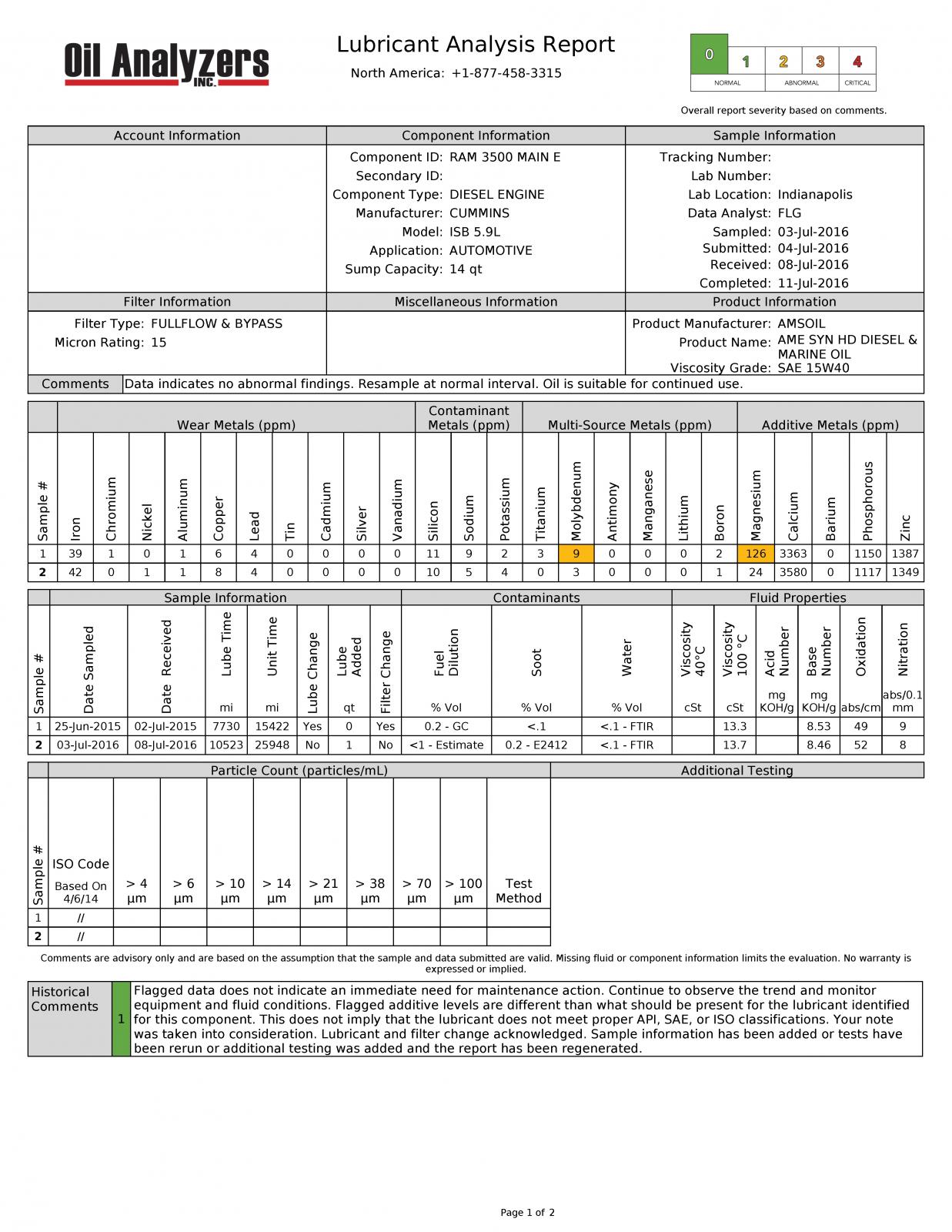
Everything posted by AH64ID
-
Travel trailer newbie!
Generally yes. My TT is a little different thou. I have a frame that is typically used on 10K-12K trailers and a pair of 5,200lb axles with a 7,900 GVWR. GVWR was determined by "delivery" weight plus 1,700lbs (IIRC) of payload. Not based on frame/axles/brakes/etc. I'll admit I ignore my GVWR on this trailer. My previous trailer GVWR was matched with axle/frame and I didn't ignore it.
-
Travel trailer newbie!
Gotcha. Delivery/Curb/Brochure weight :-) It really depends. In most cases it's the operational limit of some component. The frame, axles, tires, brakes, etc. There are also rare "marketing" instances, just like between a 2500 and SRW 3500. Those are much more rare on a trailer thou. Just increasing tires doesn't mean you can carry more. And yes many things these days are just for liability...I just try not to pin everything on that.
-
Travel trailer newbie!
Say what?? Rated is rated not dry weight. If a trailer is rated for 8,500 that means just that... it's rated for 8,500lbs That includes food, toys, etc. Not sure why you think a 8,500lb rated trailer would be 11K lbs!! Trailer GVWR include the tongue weight. A 12,500 rated 5er should have about 3,125 max pin weight and 9,375 on the axles, per the rating. There is far more to a trailer GVWR than the tires. You're doing some very fuzzy trailer math.
-
Travel trailer newbie!
Running max sidewall pressure isn't over-inflated as long as you're at max load. Any load less and it is over-inflated. That too is a broad generalization but the only tire company (not 3rd party, but actual tire manufacturer) that I have ever seen that wants their trailers at max psi is the one you linked the other day.. Carlise? Otherwise every single tire manufacturer I have researched wants proper pressure for the load, and anything else is under-inflated or over-inflated. Too much air for the load absolutely is over-inflated. Everybody I know with a car trailer or a dump trailer has crappy tire wear on their trailers from running max psi all the time. The centers wear out very fast at max pressure and min load. Where did you find that ST tires are not supposed to flex? First I have ever heard of it. In fact they need to have plenty of sidewall flex in order to scrub on tandem and triple axle setups. When I was talking to Toyo about how low I could run my 19.5's I understood the 70 psi minimum to be twofold. First is keeping the bead set as xx.5" tires don't hold beads like car rims, and second was to prevent flexing and heat buildup in the sidewall. These tires are not supposed to flex. I have also worn ST's out quite easily inside their 5 year window, and honestly not even with that many miles on them. Traveling on gravel/dirt/chipseal roads is hard on tires.
-
My latest UOA
The oil sample only takes a couple ounces. I collect mine at the bypass filter return cap so it's very clean. On my wifes 4Runner I installed a petcock to same oil with. I do not change the filters. The Donaldson ELF7349 is a 25K mile rated filter and the bypass is a 60K mile rated filter. I change them both with the oil annually.
-
Travel trailer newbie!
Don't forget the tongue weight of 10-15% which puts the trailer axle load at 8500-9000 lbs (2125-2250/tire assuming equal loading) which doesn't have the tires quite at their max. Your car trailer is probably a great example of overinflated tires and traction. At 65 psi and 10K lbs the trailer probably has good brakes that don't lock easily but at 65 psi and only the base trailer weight the brakes are probably touchy and need finesse. Car haulers and dump trailers are unique as one simply cannot adjust the pressure each load but they are great for demonstrating the effects of overinflation.
-
Reciever locks?!
I have used one in the past but had the same issue Michael's friend did so I quit using them.
-
Engine Oil
That's a good price, even in 2005. What's the shelf life of Delo 400? A quick search showed 60 months, but I didn't look too deeply into it.
-
Power steering fluid filter
It depends on how you tap into the return line. If the filter is after the T for the brake/steering return and it plugs your brakes will be effected, until they blow the low pressure return line off. Even then if flow thru the hydroboost is restricted, as it would be with a steering return blockage, your brakes will be effected. I don't think it's really that big of a concern and just pointing out a plugged return will effect the operation of a hydraulic system. It's the reason many return filters have bypass valves while pressure filter don't in redundant systems.
-
Travel trailer newbie!
Stating that all ST tires are not over inflated at sidewall pressure is a false blanket statement. I know that you are aware, based on our previous conversations, that some ST manufactures want you running pressure based on load. That means max air pressure at 50% load is over inflated. Proper pressure, not sidewall max, isn't about "suspension" it's about proper tire dynamics. A properly inflated tire has better handling, lateral traction, and braking. The tire also wears better and is less prone to road hazards, such as carcass damage from potholes and punctures. Overinflated is certainly harder on tires than proper pressure. Yes heat kills tired but a properly inflated tire doesn't run hot. Trailer brakes already lock up too easily when road conditions change and over inflating them just makes it worse. Class 8 tires have steel sidewalls and those are very different than ST or even LT tires. I cannot run my 19.5's less than 70 psi for that reason but at slow speeds my LT's can be severely under inflated and no damage will occur...very slow speeds.
-
UDC Pro is here for 03-07 5.9's!!!
I have around 4K miles now with pro and it's been great, but still now towing... been an odd year for that but I should hook up to the trailer soon. The biggest thing I have done is with the pilot and killing most of it has been very very nice! I am currently playing with fan control as it was just released. We also have control over the 2nd WIF sensor option so my 2nd senor will be going back in at my next filter change. I have installed the ComMod and now can tune/flash in real time. It's great for messing with small parameters you want to test prior to a 5 minute flash. There are some tables that deal with fueling during 0 load rpm drop (think rev to 2500 and let off the throttle or shifting a manual trans truck). Tuning them in real time is sooo much better than a full flash. A small tweak on the laptop, transmit the change and check. It's literally that fast. I did cut my pilot completely out the other day and it sounded like a 24V. For the little testing I did my timing was fine where it was but the sound was much different. I may mess with that more in the future but a lot of the pilot stuff cannot be shutoff in real time, but timing can be.
-
Power steering fluid filter
If the return plugs you still lose the breaks. The return has to keep moving to allow the pressure to flow. I have often thought about a filter on my truck as PS fluid takes a beating.
-
My latest UOA
This is a good reason why I run Amsoil AME in my truck. As you can see the oil had over 10K miles on it. I ended up running it a little longer than I have been the last few years because I did a trip in May/June to Arizona and didn't figure the additional highway miles would hurt, and they didn't. 10,583 miles, 308 hours, 733.8 gallons, and just under 13 months. Of those miles 2679 were towing which is a decent percentage when you take out the 3544 miles I did in 6 weeks to/from Arizona, which is just under 40% towing. The oil looks like it had quite a bit of life left in it but I'm good changing it. Not to bad for making 410/850 to the ground and using the truck pretty hard. *Don't mind the two cautions on last years change as they were a carryover from the Delo 400 LE on the change before.
-
Travel trailer newbie!
I almost always dump my grey on the ground but I do position my trailer to do so and dig a hole. It's no different, IMHO, than having a jug on a table for washing hands when tent camping. I'm not sure if it's legal or not but I have never been questioned about it. I prefer to travel with tanks full or empty. Partially full tanks are very hard on the mounts and straps as they are not baffled. Not much I can do about the black tank but the grey and fresh are easier to fill/empty.
-
Travel trailer newbie!
You said it yourself... incorrect air pressure. Run tires properly and issues don't generally happen. I never had a single issue with my tires related to speed or weight, and the only flats I had were punctures on nasty forest service roads. Load and inflate them properly and they will work as advertised, in my experience. The only ST tires I have ever ran are OE ones, so no upgrading here.
-
Travel trailer newbie!
Lots of good info in here. Don't be afraid of 65 mph. I have never had any issues towing a TT at 65 (maybe 70...) as long as there is proper air in the tires, but that's my own experience over the last 8 years dragging TT's around. I've never had a trailer flat on paved roads and never from speed. Proper loading and air are key thou. In terms of leveling I always recommend erring on the side of having the head of your bed a little high, not much but better to be a hair high at your head than at your feet... the headache will let you know when your feet are high and it's not an easy one to ditch. Be sure to use a load leveling hitch. The truck is more than capable of the tongue weight but they tow SO much better with a load leveling hitch. Both your back and your stuff in the trailer will appreciate a good W/D hitch. Tongue weight, tongue weight, tongue weight. Too much is better than too little in terms of trailer stability. 15% is the max recommended but don't feel bad if you hold 15%.
-
Goose neck adapter
It's been a few years but I was never able to find any trailer manufacturers that allowed the use of a converter/adapter..... It's a big part of the reason I purchased a TT vs a 5er.
-
Proper Nv5600 fluid
Part of the reason I try not to buy Mopar. It' not bad, but it's always overpriced. There are generally always like or superior products available for less.
-
Proper Nv5600 fluid
Good info. I haven't looked at it in years, nearly 10.
-
Teardown and Rebuild
I run the Donaldson M085171 and it sounded great by itself but the exhaust brake was deafening so I added an OEM megacab resonator. I'll likely go with a slightly quieter muffler next time but it's hard finding good flow at low restriction. I may have to go 5" in/out with reducers for 4" pipe. Go to the page with the M085171 and look at the blue lines with 3" in/out and 4" in/out and you can see how much is gained with 1" of change. The same muffler in 4" flows 78% more exhaust at 1in hg. https://www.donaldson.com/content/dam/donaldson/engine-hydraulics-bulk/catalogs/Exhaust/North-America/F110028-ENG/Exhaust-Product-Guide.pdf
-
Proper Nv5600 fluid
IIRC Mopar is Penzoil Syncromesh in a Mopar bottle, but's it's been a while since I looked it up. I change mine every 50K miles.
-
Teardown and Rebuild
Looking purely at the CFM capabilities a 4" exhaust is perfect for most users. 3" gets restrictive with any decent airflow over about 2000 rpms and why OEM went to 4". 5" is really only needed at high rpm and high airflow. The mufflers are also a big factor in the restriction. A 380 flywheel hp 5.9 at 3000 rpms and 30 psi of boost can move 1700+ CFM of exhaust. Obviously the cam can have a big effect of CFM/boost as does rpm and turbo to a lesser extent. 5 inhg is the max back pressure Cummins wants and less than 3 inhg is preferred. My big 40" muffler has the flow I need but many mufflers don't. 1800 CFM @ 1inhg.
-
Proper Nv5600 fluid
Filters weren't the topic it was an example of where a 3rd party used something they didn't make in a manner it was specifically built for and advertised it as something it wasn't. It's an easy one to reference because it has been around and fairly well known for many years. MT-1 specification is pretty simple. The designation API MT-1 denotes lubricants intended for nonsynchronized manual transmissions used in buses and heavy-duty trucks. Lubricants meeting the requirements of API MT-1 service provide protection against the combination of thermal degradation, component wear, and oil-seal deterioration, which is not provided by lubricants in current use meeting only the requirements of API GL-4 or 5. API MT-1 does not address the performance requirements of synchronized transmissions and transaxles in passenger cars and heavy-duty applications. API MT-1 lubricants should not be mixed with engine oils in the same transmission unit. Transmission manufacturers' specific lubricant quality recommendations should be followed. The performance specifications of API MT-1 are defined in the most recent version of ASTM D5760. Directly from the API Lubricant Service Designation. http://www.api.org/~/media/files/certification/engine-oil-diesel/publications/1560-eighth-edition-april-2013.pdf API is the standard on the specs. MT-1 is intended for nonsyncronized manual transmissions.
-
Proper Nv5600 fluid
And I wouldn't have thought that Airdog and FASS would have used inferior filters on the lift pumps but they did so for a number of years, all while claiming improved filtration. When I started questioning the filtration issues back in early 2008 my comments where treated just like your treating them with the trans fluid; however, what filters are on your AD now? You were told it was better than OEM when you bought it yet it was far WORSE. Doing your own research and leaving the 3rd parties out is the best way to get the facts and proper information. I have seen TOO many times where companies advertise and sell something, that they don't manufacture but utilize in a kit or rebuild, that is completely wrong for the application. Just because it's sold by a 3rd party doesn't mean it's proper to the application. I use the FASS/AD example because it was a big deal about 8 years ago and people are still finding out that their advertised improved filtration isn't better and sometimes worse to this day. If you take 3rd party away and look at OEM information, from both the trans manufacturer and fluid makers, there is a reason to stick with the OEM specified fluid in the NV4500 and NV5600. It should even be considered that the NV5600 and NV4500 need different fluids when they are made by the same company and put in the same vehicles. That alone should be a red flag when someone tries to sell you a fluid that's for a different spec. NV didn't even build them to use the same fluid.. there is going to be a good reason for that.
-
Proper Nv5600 fluid
The NV5600 is known to be picky on fluids for it's syncro's. Delvac 50 is a MT-1 fluid which the primary application is non-syncro'd transmissions... not a great choice for something with picky syncro's. Delvac 50 doesn't meet any other specs, per Mobil. You honestly don't have even close to enough miles on your new NV4500 to state if there are issues or not. Using a fluid with a different spec could take a long time to manifest the issues, not a couple months. The G56 did/does have the "wrong" spec fluid in it from the factory and most of the aftermarket recommendations don't even take into account the actual MB spec'd fluid. Bottom line is there are a lot of people who don't really understand fluids making a lot of off the wall recommendations on fluids, it's kinda funny to ask if it's not your trans the fluid is in :-) If all the fluids were universal to all transmissions there wouldn't be so many different types of fluid specs.




